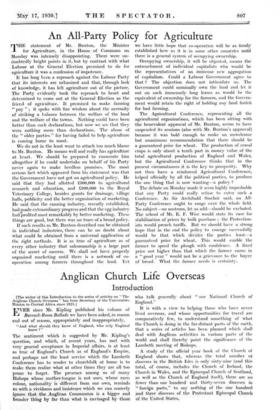An All-Party Policy for Agriculture
;THE statement of Mr.. Buxton, the Minister .1- for Agriculture, in the House :of Commons on ,Monday was intensely disappointing. There were un- doubtedly bright points in it, but by contrast with what .Labour at the General Election promised to do for agriculture it was a confession of impotence.
It has long been a reproach against the Labour Party that its interests are urbanized and that, through lack of knowledge, it has left agriculture out of the picture. The. Party evidently took the reproach to heart and determined to come out at the General. Election as the friend of agriculture. It promised to make farming " pay " ; it spoke with fine wisdom about the necessity of striking a balance between the welfare of the land and the welfare of the towns. Nothing could have been ,better than such declarations, but now we see that they were nothing more than declarations. The abuse of the " older parties " for having failed to help agriculture is coming home to roost.
We do not in the least want to attach too much blame to Mr. Buxton. He means well and really has agriculture at heart. We should be prepared to exonerate him altogether if he could undertake on behalf of his Party never again to make heedless promises. The most serious fact which appeared from his statement was that the Government have not got an agricultural policy. He said that they had allotted £500,000 to agricultural research and education, and £100,000 to the Royal Veterinary College, besides grants for drainage, village halls, publicity and the better organization of marketing. He said that the canning industry, recently established, hadrade extraordinary progress and that the egg industry had profited most remarkably by better marketing. These things are good, but there was no trace of a broad policy.
If such results as Mr. Buxton described can be obtained in individual industries, there can be no doubt about what could be obtained from a universal application of the right methods. It is as true of agriculture as of every other industry that salesmanship is a large part of the secret of success. We shall not have , properly organized marketing until there is a network of co- operation among farmers throughout the land. Yet we have little hope that co-operation will be as firmly established here as it is in some other countries until there is a general system of occupying ownership.
Occupying ownership, it will be objected, means the entrenchment of individual capitalists who would be the representatives of an immense new aggregation of capitalism. Could a Labour Government agree to .that ? The objection does not intimidate us. The Government could. nominally own the land and let it out on such immensely long leases as would be the equivalent .of ownership for the farmers, and the. Govern- ment would retain' the right of holding any land forfeit for bad farming.
The Agricultural Conference, representing. all the agricultural organizations, which has been sitting with -the benevolent approval of Mr. Buxton, seems to have suspended its sessions (also with Mr. Buxton's approval) 'because it was bold enough to make an unwelcome but unanimous recommendation that there should be a guaranteed price for wheat. The production of cereal crops is only about a tenth part in money value of the total agricultural production of England and Wales, but the Agricultural Conference thinks that in the present circumstances it is the key to prosperity. Why not then have a reinforced Agricultural Conference, helped officially by all the political parties, to produce the one thing that is now wanting—a policy ?
The debate on Monday made it seem highly improbable that any Party could really refuse to enter such a Conference. As Sir Archibald Sinclair said, an All- Party Conference ought to range over the whole field. No subject—no nostrum, let us add—should be excluded. The school of Mr. E. F. Wise would state its case for stabilization of prices by bulk purchase ; the Protection- ists would preach tariffs. But we should have a strong hope that in the end the policy to emerge successfully would be that which divides the parties least—a guaranteed price for wheat. This would enable the farmer to speed the plough with confidence. A fixed price not higher than that which the farmer earns in a " good year " would not be a grievance to the buyer of bread. What the farmer needs is certainty.














































 Previous page
Previous page